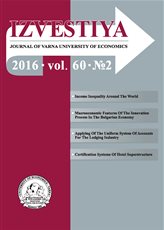National Cluster Policy in Bulgaria: Nature and Main Characteristics
National Cluster Policy in Bulgaria: Nature and Main Characteristics
Author(s): Irena Slavova, Yovka BankovaSubject(s): National Economy, Business Economy / Management
Published by: Икономически университет - Варна
Keywords: clusters; policies; strategies; program;, financial mechanisms
Summary/Abstract: The prospects for the companies and regions to benefit of cluster formations encourage governments in different countries to implement policies to support clusters. Clusters have become an integral part of EU policy and governmental policies in different countries; already a pillar of their economic and regional development. The main objective of the paper is to analyze the national cluster policy in Bulgaria and on this basis the main characteristics of that policy to be outlined. To achieve the objective the current research, presented in the paper, covers three interrelated elements that characterize national policy: first, strategic planning documents that define the role of clusters as a tool to achieve strategic objectives and priorities related to the national development; secondly, national programs supporting the creation and development of cluster formations to achieve strategic objectives; third, governmental authorities responsible for the execution of programs and for the implementation of cluster policy in Bulgaria. The results of the research are interpreted in the context of the widely accepted in economic theory and practice perception for the crucial role of clusters to increase competitiveness, innovations and economic development, and from the point of view of the recorded experience of other EU member states. National cluster policy in Bulgaria is still underestimated and its performance is limited mainly to the implementation of financial mechanisms as the main result is the extremely high number of new "clusters" that exceeds significantly the numbers in many other developed countries experienced already in cluster development. So, we can conclude that the national policy should be improved, both in terms of direct commitment and responsibility of different governmental bodies / institutions in the development and implementation of cluster policy, as well as in aspect – a clear profile of the programs supporting the creation and development of clusters to be defined in Bulgaria.
Journal: Izvestiya. Journal of Varna University of Economics
- Issue Year: 60/2016
- Issue No: 2
- Page Range: 185-216
- Page Count: 16
- Language: English

